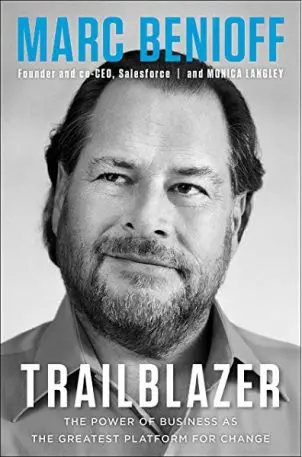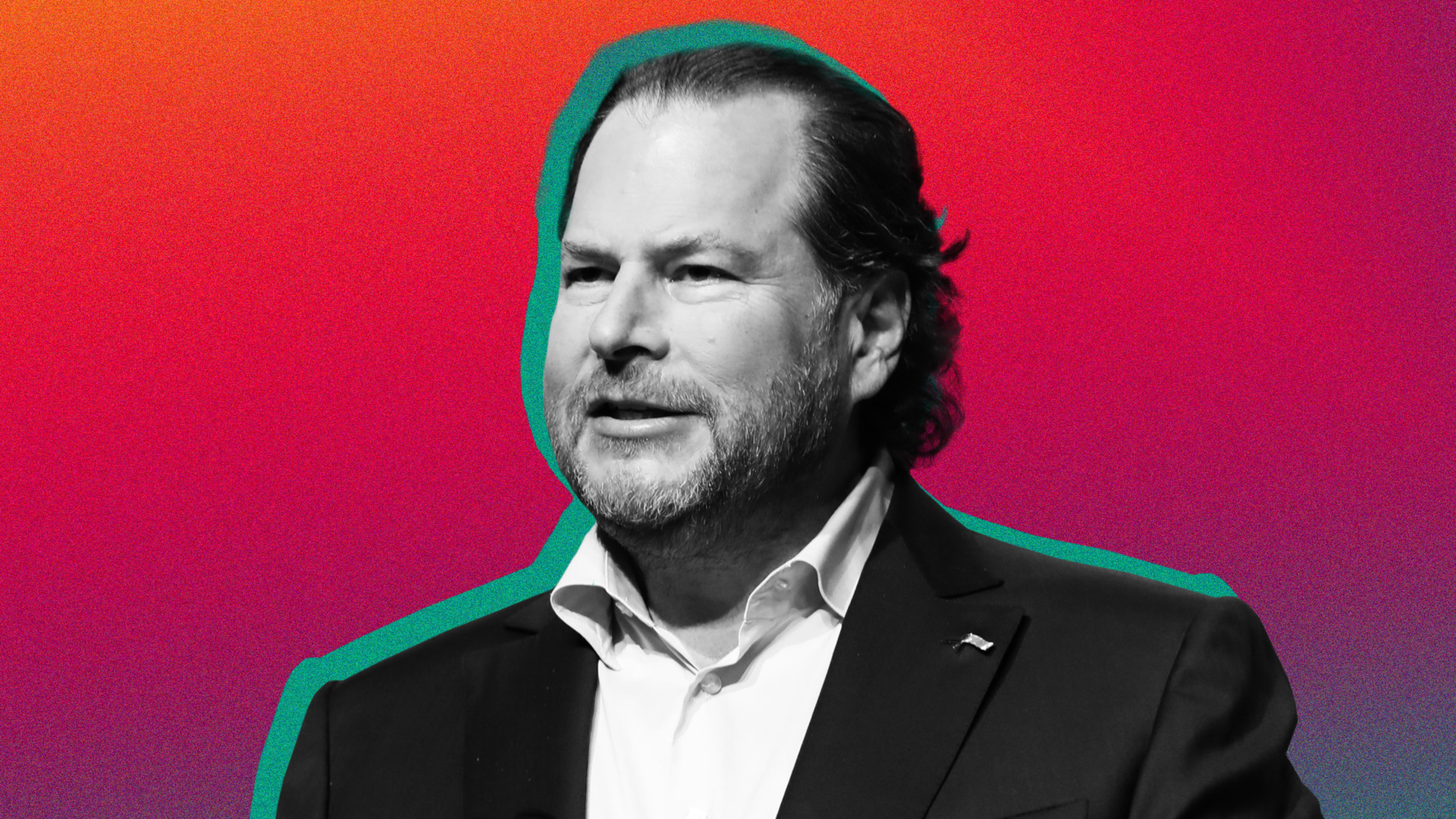“Do you know how many trees are on the planet Earth?”
“I wish I did.”
“There’s 3 trillion trees. Do you know how many there used to be?”
“How many?”
“Six trillion. If you plant 1 trillion trees, do you know how much carbon you sequester?”
“How much?”
“205 gigatons. It’s as much carbon as has been created since the first Industrial Revolution. So that’s very powerful to know that. And did you know that there’s people today who are on campaigns to plant a trillion trees? If you plant a trillion trees, you will dramatically reduce global warming.”
Salesforce co-CEO Marc Benioff is politely schooling me about a wildly ambitious way to address climate change. And the fact that he takes it seriously leads me to take it seriously. After all, in an era when it’s rational to worry about the impact of big tech companies on our world, the cofounder of the provider of cloud-based enterprise software and services has as impressive a record as any currently active tech titan when it comes to leveraging his company’s enormous success for the greater good.
Benioff has put some of his thoughts on this topic on paper in the form of Trailblazer: The Power of Business as the Greatest Platform for Change, a new book he wrote with former Wall Street Journal reporter Monica Langley. I spoke with him recently about the book and how he became an “activist CEO”—a term he says he initially found unnerving.

“When I went to school, we didn’t have classes on equality or net zero or ethical use of products,” he explains. “This is not what it meant to be a CEO. Being a CEO was just about following the principles of Milton Friedman. That is, it was only about making money. But now being a CEO means that you’re taking care of all stakeholders. That stakeholder return is as much table stakes as shareholder return.” (Salesforce, which has delivered a 3,500% return on investment to its shareholders as a public company, has flourished on both fronts.)
Activism at home
Salesforce’s impact on the world is especially tangible in its hometown, which is also Benioff’s own birthplace: San Francisco. The company is the city’s largest employer; its Salesforce Tower headquarters the tallest building; and its annual customer event, Dreamforce, the largest conference. In Trailblazer, Benioff credits some of his sense of civic responsibility to his maternal grandfather, Marvin Lewis—a San Francisco lawyer, city supervisor, and advocate for the building of the Bay Area Rapid Transit subway system, which opened in 1972—though he credits coauthor Langley for connecting the dots between Lewis’s commitment to the city and his own. Benioff and his wife, Lynne, have given hundreds of millions to causes in San Francisco, ranging from homeless programs to the children’s hospitals that bear their name.
Benioff’s most provocative act of local advocacy was his support for Proposition C, the 2018 San Francisco ballot measure involving a law that would institute a tax on the city’s largest businesses, with the proceeds going to fund homeless services. (It passed, though courtroom battles have prevented any money from being dispersed to date.)
Despite the proposed law’s impact on Salesforce’s bottom line (about $10M-$11M a year), Benioff threw himself into the campaign in favor of it. On Twitter, he pushed back on other San Francisco tech execs who opposed it—such as Twitter and Square’s Jack Dorsey, Stripe’s Patrick Collison, and Zynga’s Mark Pincus—and shared stats on its potential positive impact on the city’s most seemingly intractable problem. Today, he confidently calls homelessness in San Francisco “easily resolvable” but adds that, “we need a clear, directed funding source to solve the homeless [issue]” by funding antidotes such as extremely low-income housing.
CEO @jack created $50B in market cap in Twitter & Square & $6B personally in our city & received a special Mid Market Tax Break. Exactly much have his companies & personally given back to our city, our homeless programs, public hospitals, & public schools? Yes @OurHomeSF.
— Marc Benioff (@Benioff) October 12, 2018
When I asked Benioff about his experience trying to cajole other CEOs into supporting Prop C, he didn’t mention any specific names. But adopting a biblical metaphor, he told me that this dialogue, and others he’s had with his fellow CEOs about social responsibility, is “basically the Sea of Reeds. It splits in half. You have people on one side who want to improve the state of the world, or their city, or their community. They look at business as the greatest platform for change. They see that they have the resources and ability to positively impact others. And then you have the other half that is only interested in making money.” (Me: “Is it really that binary?” Benioff: “Yeah, it’s that binary.”)
The 1% principle
Unlike some of his peers, Benioff didn’t wait until he was a billionaire to formulate a plan for using his money and influence for positive change. Twenty years ago, before Salesforce had shipped its first product, he declared that it would devote 1% of its equity, products, and employee time to philanthropic efforts. Though his startup’s rise made that promise powerful, its greatest impact has come from fact that hundreds of other companies have followed his lead.
Given that longstanding effort, I was surprised to learn from Trailblazer that Benioff experienced an epiphany about his power as a CEO as recently as 2015. It happened when Mike Pence, then the governor of Indiana, signed a bill that would permit discrimination against people who are lesbian, gay, bisexual, or transgender on religious grounds.
Benioff, as you might expect, took visceral offense to the legislation: “I was born on Divisadero Street in San Francisco 55 years ago, and I live in the city which is the home of gay rights,” he told me. “This is where it was birthed.” But his opposition wasn’t just on principle. Salesforce also has a major outpost in Indianapolis, so the law threatened employees. The good news was that the company’s stance as Indiana’s largest tech employer gave him the kind of economic leverage that politicians understand.
We are forced to dramatically reduce our investment in IN based on our employee's & customer's outrage over the Religious Freedom Bill.
— Marc Benioff (@Benioff) March 26, 2015
“I was in unexplored territory for a CEO,” says Benioff, who knew that he wouldn’t win universal approval by taking a stand. He decided to wage a public, multi-front battle against the law, which included announcing plans to move a customer conference out of the state, rallying other CEOs to speak out, and tweeting up a storm of opposition. Pence ended up calling him about the law, and—eight days after signing it—amending it to roll back its ability to enable anti-LGBT discrimination.
In Trailblazer, Benioff and Langley write about the increasing desire among employees to work for companies that take ethical stances. Despite Benioff’s own longstanding intention to do just that, he told me that he’s grateful for the pressure that Salesforce staffers put on him—even in instances such as when employees protested Salesforce’s contract with the U.S. Custom and Border Protection Agency, a deal that the company ultimately chose not to undo in the wake of the Trump administration’s separation of children from their parents at the southern border.
“Whether it’s the issue in Indiana, whether it was pay equality, where our female employees came and said, ‘We’re not being paid the same as men, and you need to correct that,’ that comes from giving our employees permission to bring their values to work,” he says. “And also to have the courage to be able to say to me and to others, ‘This is what I want.'”
Similar pressure is making a difference even at organizations that might not have actively solicited it in the past. In August, Business Roundtable, an organization of big-company CEOs, issued a new “Statement on the Purpose of a Corporation” that stepped away from the once-cherished wisdom that shareholder value trumped all other corporate concerns. Instead, it emphasized the necessity of doing right by employees, suppliers, and communities. Benioff calls this official stamp of approval for the philosophy he long ago came to on his own “the most important thing that’s happened” when it comes to corporate activism.
“The more that we can talk about this, socialize it, and evangelize it, the bigger impact we’re going to have with other businesses,” he says. “And that is very much why I wrote the book. It’s a book for everyone from the CEO to the intern, and anyone who wants to make the world a better place.”
Recognize your brand’s excellence by applying to this year’s Brands That Matter Awards before the early-rate deadline, May 3.
